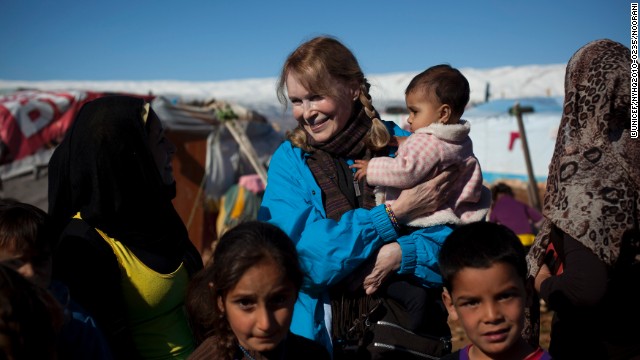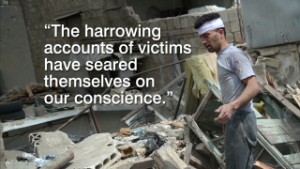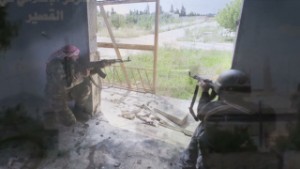- Back to Home »
- Mia Farrow: Don't let Syria's children die

- Mia Farrow: Three years into Syria's civil war, more than 80,000 people have died
- Farrow: In this humanitarian catastrophe, women and children are hit hard especially
- She says UNICEF worries that Syrian children could die from preventable diseases
- Farrow: Until a political solution can be found, we must help Syria's most vulnerable victims
Editor's note: Actress Mia Farrow has traveled extensively as an ambassador for UNICEF, including trips to Angola, Cameroon, Chad, Central African Republic, the Democratic Republic of Congo, Haiti, South Sudan and Uganda. She has been active in the organization for more than 12 years. Farrow starred in the film "Rosemary's Baby" and has appeared in many other films, including "The Great Gatsby," "Death on the Nile" and "Hannah and Her Sisters."
(CNN) -- As most of us are agonizingly aware, Syria's bloody conflict has entered a third year.
Graphic videos and reports of civilians being subjected to aerial bombardments, executions, torture, rape, massacres -- atrocities of the worst kind -- have horrified the world and caused much handwringing in many languages and in high places where everyone agrees the situation in Syria is complicated.
Everyday realities on the ground, however, are completely clear: Homes, hospitals, schools, shops, entire water systems and whole sections of ancient cities have been bombed and reduced to rubble. More than 80,000 Syrians, including thousands of children, have perished.
At least 4.25 million civilians inside Syria have sought refuge in caves, ruins or in abandoned schools.
Another million and a half have fled into neighboring countries -- Jordan, Lebanon, Iraq, Turkey and Egypt -- where they are stressing scarce resources.
It cannot be said that they are welcome guests. Their numbers and varied ethnicities threaten to further destabilize an unsteady region. But they keep coming.
 U.N.: War crimes happen daily in Syria
U.N.: War crimes happen daily in Syria  Growing concern for besieged Syrian city
Growing concern for besieged Syrian city In January, I traveled with UNICEF to visit with refugee families along Lebanon's restive borders with Syria.
Snow covered the hills. People had managed to cobble together pieces of billboards, boxes and fabrics that shuddered against frigid winds.
Ragged, tangle haired children stared.
Many had arrived in Lebanon during the summer, and so they were without coats and shoes. They had fled with their lives and little else.
Mahmoud, an angel-faced but unsmiling 7-year-old, described his journey from Homs into Lebanon. His father and brother had been killed. His home and school were bombed. The sky, he said, was "filled with fire." People scattered.
With two other families, the boy and his mother made their way through a dark, tense night, darting then stopping to avoid being detected by military, praying not to be shot or to tread on a land mine. The explosive devices, Mahmoud explained, have a red spot on them, and they are planted all along the Syrian side of the border.
The women spoke of their lost husbands, brothers, sons; of homes, careers and ways of life lost, too. Some women had been raped. "We are traumatized," they told me.
Halima, who had been a practicing lawyer in Syria said, "We don't want to be here. We don't want handouts. There is no dignity for us. We hope the fighting will end so that we can go home. We only want peace."
Now, four months later, the snow and sleet are giving way to the summer heat and bringing new dangers. Dirty water, no toilets, poor nourishment: This is brew for cholera and other killer diseases sure to spread rapidly in crowded camps and shelters.
UNICEF worries these traumatized, malnourished children who survived a nightmare in Syria could start dying from preventable diseases.
Under the most difficult and dangerous circumstances, UNICEF staff and UNICEF's partners are courageously working around the clock inside Syria and in neighboring countries delivering life-saving supplies; emergency rations, water purification tablets, medicine, clothes, blankets, vaccinations and access to school.
No one could have anticipated the enormity of the humanitarian catastrophe that is now unfolding.
Until a political solution to Syria's conflict can be found, its innocent and most vulnerable victims must be kept alive.
Follow us on Twitter @CNNOpinion.
Join us on Facebook/CNNOpinion.
The opinions expressed in this commentary are solely those of Mia Farrow.







